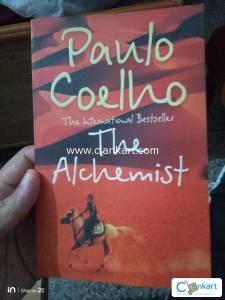Buy used Philosophy online in India
Buy Second Hand Books, Used Books Online In India
The Devil and Miss Perym
A community devoured by greed, cowardice and fear. A man persecuted by the ghosts of his painful past. A young woman searching for happiness. In one eventful week, each of them will face questions of life, death and power, and each of them will have to choose their own path. Will they choose good or evil?The remote village of Viscos is the setting for this extraordinary struggle. A stranger arrives, carrying with him a backpack containing a notebook and eleven gold bars. He comes searching for the answer to a question that torments him: are human beings, in essence, good or evil? In welcoming the mysterious foreigner, the whole village becomes an accomplice to his sophisticated plot, which will forever mark their lives.In this stunning new novel, Paulo Coelho dramatises the struggle within every soul between light and darkness, and its relevance to our everyday struggles: to dare to follow our dreams, to have the courage to be different and to master the fear that prevents us from truly living. The Devil and Miss Prym is a story charged with emotion, in which the integrity of being human meets a terrifying test.
Dont believe everything you think
Purchased directly from the publisher, authorized distributor, or author. Never used. Professionally spiraled and resold by Sweethome Books. Sweethome Books is not necessarily affiliated with, endorsed by, or authorized by the publisher, distributor, or author.
The Laws of Human Nature
Robert Greene is a master guide for millions of readers, distilling ancient wisdom and philosophy into essential texts for seekers of power, understanding and mastery. Now he turns to the most important subject of all - understanding people's drives and motivations, even when they are unconscious of them themselves.We are social animals. Our very lives depend on our relationships with people. Knowing why people do what they do is the most important tool we can possess, without which our other talents can only take us so far. Drawing from the ideas and examples of Pericles, Queen Elizabeth I, Martin Luther King Jr, and many others, Greene teaches us how to detach ourselves from our own emotions and master self-control, how to develop the empathy that leads to insight, how to look behind people's masks, and how to resist conformity to develop your singular sense of purpose. Whether at work, in relationships, or in shaping the world around you, The Laws of Human Nature offers brilliant tactics for success, self-improvement, and self-defence.
The Alchemist
Like the one-time bestseller Jonathan Livingston Seagull, The Alchemist presents a simple fable, based on simple truths and places it in a highly unique situation. And though we may sniff a bestselling formula, it is certainly not a new one: even the ancient tribal storytellers knew that this is the most successful method of entertaining an audience while slipping in a lesson or two. Brazilian storyteller Paulo Coehlo introduces Santiago, an Andalusian shepherd boy who one night dreams of a distant treasure in the Egyptian pyramids. And so he's off: leaving Spain to literally follow his dream. Along the way he meets many spiritual messengers, who come in unassuming forms such as a camel driver and a well-read Englishman. In one of the Englishman's books, Santiago first learns about the alchemists--men who believed that if a metal were heated for many years, it would free itself of all its individual properties, and what was left would be the "Soul of the World." Of course he does eventually meet an alchemist, and the ensuing student-teacher relationship clarifies much of the boy's misguided agenda, while also emboldening him to stay true to his dreams. "My heart is afraid that it will have to suffer," the boy confides to the alchemist one night as they look up at a moonless night. "Tell your heart that the fear of suffering is worse than the suffering itself," the alchemist replies. "And that no heart has ever suffered when it goes in search of its dreams, because every second of the search is a second's encounter with God and with eternity." --Gail Hudson
Ikigai: The Japanese secret to a long and happy life -Brand New book
Bring meaning and joy to all your days with the internationally bestselling guide to ikigai.According to the Japanese, everyone has an ikigai – a reason for living. And according to the residents of the Japanese island of Okinawa – the world’s longest-living people – finding it is the key to a happier and longer life.Inspiring and soothing, this book will bring you closer to these centenarians’ secrets: how they leave urgency behind; keep doing what they love for as long as possible; nurture friendships; live in the moment; participate in their communities and throw themselves into their passions. And it provides practical tools to help you discover your own personal ikigai. Because who doesn’t want to find the joy in every day?
Indian fiscal Federalism Y V REDDY G Y REDDY
Likening fiscal federalism to a game between the Union and the States, and among the States themselves, Indian Fiscal Federalism lays bare the complex rules of play. It examines the pivotal role of Finance Commissions and assesses momentous events since 2014, such as the replacement of the Planning Commission by NITI Aayog, the emergence of the GST Council, and the controversies surrounding the Fifteenth Finance Commission. The book offers a historical perspective on fiscal federalism, in particular the interplay and overlap of institutional mechanisms. In doing so, it examines persistent as well as immediate concerns, and offers a way forward. A contemporary, timely, and comprehensive analysis of fiscal federalism in India, this is a must-read for all those interested in the subject.
Meditations by marcus aurelius
Nearly two thousand years after it was written, Meditations remains profoundly relevant for anyone seeking to lead a meaningful life.Few ancient works have been as influential as the Meditations of Marcus Aurelius, philosopher and emperor of Rome (A.D. 161–180). A series of spiritual exercises filled with wisdom, practical guidance, and profound understanding of human behavior, it remains one of the greatest works of spiritual and ethical reflection ever written. Marcus’s insights and advice—on everything from living in the world to coping with adversity and interacting with others—have made the Meditations required reading for statesmen and philosophers alike, while generations of ordinary readers have responded to the straightforward intimacy of his style. For anyone who struggles to reconcile the demands of leadership with a concern for personal integrity and spiritual well-being, the Meditations remains as relevant now as it was two thousand years ago.In Gregory Hays’s new translation—the first in thirty-five years—Marcus’s thoughts speak with a new immediacy. In fresh and unencumbered English, Hays vividly conveys the spareness and compression of the original Greek text. Never before have Marcus’s insights been so directly and powerfully presented.With an Introduction that outlines Marcus’s life and career, the essentials of Stoic doctrine, the style and construction of the Meditations, and the work’s ongoing influence, this edition makes it possible to fully rediscover the thoughts of one of the most enlightened and intelligent leaders of any era.
























